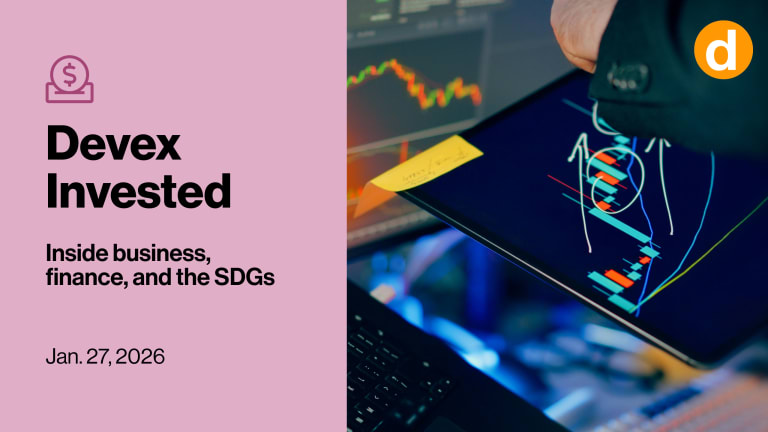
This is a preview of our latest edition of Devex Invested. Sign up to receive this weekly newsletter inside business, finance, and the SDGs.
The global energy industry must navigate a “narrow and extremely challenging” path to reach net-zero emissions by 2050 — but doing so is not impossible, according to a new report from the International Energy Agency. Still, the COVID-19 pandemic seems to have pushed the goal of universal energy access further from reach; last year, the number of people without access to electricity in sub-Saharan Africa likely rose for the first time since 2013.
• “Finance is key, or else nothing will happen. It doesn’t matter how great policies are,” Damilola Ogunbiyi, the United Nations’ special representative for sustainable energy, tells Devex. Tackling access to electricity and clean cooking requires $41 billion annually, Ogunbiyi said. But only about $16 billion comes through each year, either via development finance institutions, private funds, or commercial channels.
• The U.S. administration’s initial budget request for fiscal year 2022 asks Congress to allocate $2.5 billion to international climate programs, with about half going to the Green Climate Fund to help low-income countries address climate change. The congressional hearing I covered last week indicates some tension around U.S. global climate funding.
• Shareholders expect Standard Bank Group, Africa’s largest bank by assets, to announce at this week’s annual general meeting that it has committed to publishing a climate strategy and reducing “its exposure to fossil fuel assets on a timeline aligned” with the Paris Agreement.
Devex Pro: Take a look at our climate finance report.
Uphill climate
The Global Private Equity Conference convened virtually last week to discuss climate finance, the pandemic response, and more. Here’s what some speakers had to say:
"When you think about [venture capital] in emerging markets, even though there are macro and currency risks, it's actually in many ways lower risk than developed markets because capital is more efficient." — William Sonneborn, senior director, International Finance Corp.
“There are competitive advantages to purpose-driven businesses that have been underappreciated historically that are allowing them to actually win in their markets.” — Andy Kuper, founder and CEO, LeapFrog Investments.
“At this point in time, emerging markets investors need to become less risk-averse and look at opportunities in developing countries.” — Ngozi Okonjo-Iweala, director-general, World Trade Organization.
Risk away
Last week in Paris, a summit on Africa financing had one major takeaway: There was consensus around getting high-income countries to reallocate $100 billion in International Monetary Fund Special Drawing Rights to African countries by October, according to an announcement by French President Emmanuel Macron. But IMF chief Kristalina Georgieva says this will not be enough. “We have to make the private sector attracted to go into a risky environment by de-risking investments,” she said.
The summit communiqué doesn’t include many concrete commitments.
+ ICYMI: DevExplains: What are Special Drawing Rights?
Chart of the week

Go with the flow
IFC announced $2 billion in new funding to support smaller businesses and increased trade in Africa as part of its support for pandemic recovery.
Half of the funding will be invested in micro, small, and medium enterprises through mezzanine financing and risk-sharing instruments. The other half will support international trade finance in Africa to improve the flow of imports and exports.
The commitment is among the largest that IFC has made to specific initiatives in Africa. IFC Managing Director Makhtar Diop said, "it is essential to expand and adapt our approach to MSME financing and ensure that trade — which is the lifeblood of economic activity — flows without interruption."
Your next job?
Finance Adviser
French Development Agency
India
Investments of interest
• A $75 million co-financing facility was launched by the U.S. International Development Finance Corp. and Netherlands Development Finance Company, better known as FMO, to provide liquidity to financial intermediaries supporting MSMEs impacted by COVID-19. The DFC-MASSIF COVID-19 Response Co-Financing Facility is the first of its kind for DFC and will prioritize women and other underserved populations.
• The Canadian government launched 2X Canada: Inclusive Economic Recovery, which aims to “foster private sector growth in developing countries, with a focus on women’s economic empowerment.” The financing and investment facility intends to “address persistent market gaps and structural barriers faced by women.”









